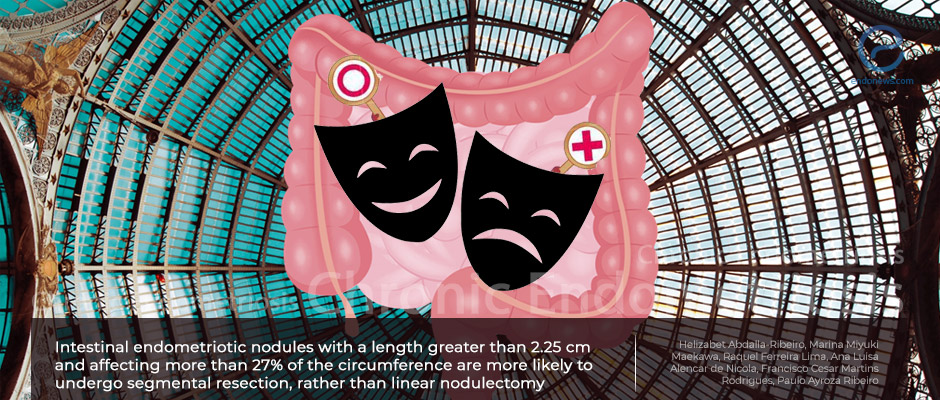Endometriosis in intestine! Segmental resection or linear nodulectomy?
May 20, 2021
Which affects the treatment choice in intestinal endometriosis: size, depth, or distance?
Key Points
Highlights:
- The presence of intestinal endometrial nodules larger than 2.25 cm and nodules affecting more than 27% of the intestinal circumference, also lower the distance between endometrial nodule and anal verge were predictive factors for segmental resection surgery rather than linear nodulectomy.
Importance:
- The present study focused on the effect of size, distance to the anal verge, and amount of intestinal circumference of endometrial nodules on the surgical treatment of intestinal endometriosis.
What's done here:
- Total charts of 111 women diagnosed with endometriosis and who underwent laparoscopic surgery were analyzed retrospectively.
- Size and site of intestinal nodules, the distance between endometrial nodule and anal verge, the affected intestine circumference, and the infiltrated intestine wall layer were recorded.
- A review of patients’ charts revealed that 36 patients underwent segmental resection and 27 patients underwent linear nodulectomy.
- Patients were divided into two groups according to surgical procedure and patients were compared in terms of preoperative characteristics, intraoperative parameters, and outcomes of the procedures.
Key Results:
- The mean operation time was 120 minutes for segmental resection and 90 minutes for linear nodulectomy, significantly longer for segmental resection.
- Extraintestinal endometriosis was significantly common in patients who underwent segmental resection.
- The distance between endometrial nodule and anal verge, the cut-off value of 10.5 cm, was a predictive factor for segmental resection.
- The endometrial nodule length of more than 2.25 cm indicated segmental resection with 88.9% sensitivity and 92% specificity.
- Endometriosis affecting ≥ 27% loop circumference was associated with segmental resection, instead of linear nodule resection.
Limitations:
- The retrospective nature of the study and a single-center experience with a relatively small number of patients are limitations.
- The authors did not focus on the cost of procedures.
Lay Summary
Intestinal involvement of endometriosis is common, and the incidence was defined between 45-56%.
Previous studies investigating the role of surgery in the management of intestinal endometriosis reported improvement of life quality in up to 95% of cases following surgery. However, it is not known exactly which surgery, namely shaving, mucosal skinning, linear nodulectomy, segmental resection, should be performed on which patients.
Dr. Abdalla- Ribeiro, and colleagues from the Department of Obstetrics and Gynecology of Santa Casa de Misericordia, São Paulo, Brazil, investigated the possible effects of the endometriosis nodules, in terms of size, location according to the anal verge, and intestinal circumference on the surgical treatment selection of intestinal endometriosis.
Authors compared segmental resection and linear nodulectomy in the management of intestinal endometriosis, and they found a significantly higher incidence of extraintestinal endometriosis and longer operation time in patients who underwent segmental resection.
In the end, authors claimed that having a distance of smaller than 10.5 cm between endometrial nodule and the anal verge, lesions being larger than 2.25 cm in length, and those affecting more than 27% loop circumference have resulted in segmental resection rather than linear nodulectomy.
This interesting paper recently published in the open access scientific journal "PLOS ONE".
Research Source: https://pubmed.ncbi.nlm.nih.gov/33857130/
intestinal endometriosis deep infiltrative endometriosis nodulectomy segmental resection laparoscopy anal verge surgery advanced stage

